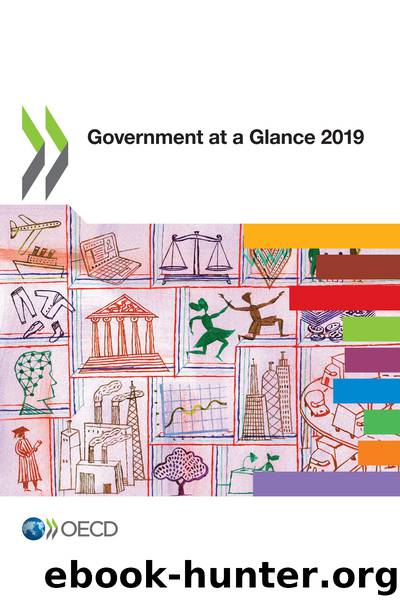Government at a Glance 2019 by OECD

Author:OECD
Language: eng
Format: epub
Tags: socialissues/governance
Publisher: OECD Publishing
Published: 2019-11-14T00:00:00+00:00
5.3. Formal policy for the implementation of a performance assessment of each project, 2018
Source: OECD (2018), OECD Survey of Capital Budgeting and Infrastructure Governance.
StatLink https://doi.org/10.1787/888934032320
Fiscal risks management
In OECD countries and beyond, the government has the ultimate responsibility to guarantee the smooth functioning of the economic system as a whole. To do so, it has to deploy several tools and assume different responsibilities. This, in turn, means that the risks affecting government finances can emanate from countless sources and government’s forecasts and plans are constantly at risks of being derailed or proven wrong.
Although fiscal risks are, by definition uncertain, awareness and understanding of them allow policy makers to increase a government’s capacity to adapt and rebound from them. Accordingly, the 2015 OECD Recommendation of the Council on Budgetary Governance advises governments to “identify, assess and manage prudently longer-term sustainability and other fiscal risks.”
In 2018, the trend was clear: a majority of OECD countries have taken steps to strengthen their fiscal risk management. About 60% of OECD countries have in place a framework or guidance – in the form of a supra-national directive or national law, regulation or policy document – for monitoring fiscal risks. Responsibility for implementing the framework often lies within the Ministry of Finance. Some countries, such as Austria and the United Kingdom have, however, taken the step to establish dedicated cross-ministerial committees to monitor fiscal risks, so as to enhance co-ordination of actors involved in fiscal risks monitoring and management. In Belgium, the Czech Republic, Luxembourg, and the United Kingdom, the independent fiscal institution identifies and analyses fiscal risks as part of its oversight function of government’s economic and/or fiscal forecasts (OECD, 2019).
Public reporting on fiscal risks is also increasingly common practice: around 75% of OECD countries publicly disclose some information on their fiscal risks. However, the means for disclosing them, as well as the breadth and depth of information published, varies widely. Information on fiscal risks is often provided in the annual budget documentation, alongside economic and fiscal forecasts. For example, Canada includes a chapter on “upside and downside risks to the economic and fiscal outlook” in its budget plan. Only Finland and the United Kingdom have taken the step to establish stand-alone fiscal risks reports. There are also some countries, like Sweden, which disclose high-quality information on specific risks in a range of reports but do not provide a consolidated vision.
OECD countries monitor similar types of fiscal risks. A vast majority of countries monitor the main variables that underlie fiscal forecasts and macroeconomic forecasts, such as the government debt, growth and demography; the stability of the financial sector; as well as potential claims on budgetary resources due to guarantees granted by the government. Within these broad categories, each country may identify specific risks related to its own circumstances. For example, risks related to government debt can include financing risks (liquidity and refinancing risks), market risks (interest and foreign exchange risks), credit risks, legal and operational risks, and model risks. Risks related to macro-economy can include the
Download
This site does not store any files on its server. We only index and link to content provided by other sites. Please contact the content providers to delete copyright contents if any and email us, we'll remove relevant links or contents immediately.
International Integration of the Brazilian Economy by Elias C. Grivoyannis(111040)
The Radium Girls by Kate Moore(12022)
Turbulence by E. J. Noyes(8042)
Nudge - Improving Decisions about Health, Wealth, and Happiness by Thaler Sunstein(7697)
The Black Swan by Nassim Nicholas Taleb(7118)
Rich Dad Poor Dad by Robert T. Kiyosaki(6620)
Pioneering Portfolio Management by David F. Swensen(6294)
Man-made Catastrophes and Risk Information Concealment by Dmitry Chernov & Didier Sornette(6013)
Zero to One by Peter Thiel(5793)
Secrecy World by Jake Bernstein(4746)
Millionaire: The Philanderer, Gambler, and Duelist Who Invented Modern Finance by Janet Gleeson(4473)
The Age of Surveillance Capitalism by Shoshana Zuboff(4286)
Skin in the Game by Nassim Nicholas Taleb(4244)
The Money Culture by Michael Lewis(4201)
Bullshit Jobs by David Graeber(4183)
Skin in the Game: Hidden Asymmetries in Daily Life by Nassim Nicholas Taleb(3997)
The Dhandho Investor by Mohnish Pabrai(3763)
The Wisdom of Finance by Mihir Desai(3741)
Blockchain Basics by Daniel Drescher(3577)
